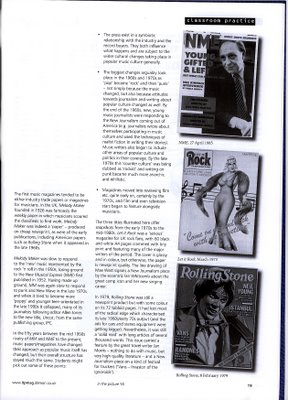Saturday, December 02, 2006
Mock Exam Tips: Task 2
Loads to choose from online but make sure you buy an actual copy of the ones you are using in the exam...
Rock
- NME (Wikipedia, Reader Profile, myspace, Observer Article, Guardian Article)
- Kerrang! (Wikipedia, EMAP, Guardian Article)
Adult
Dance/Urban
- Mixmag (Wikipedia, Reader Profile, myspace)
- RWD (myspace)
- Hip Hop Connection (myspace)
- The Source (myspace)
Key Features of magazines will possibly include (and you'll need to provide examples in the exam)...
•News
•Charts?
•Cover CD details
•Letters
•Mini-profiles of artists
•Comic photos, spoof etc.
•Major articles on major stars, new stars etc.
•Reviews of new CDs
•Reviews of gigs
•Gig guide
•Classifieds
Part Two (second bullet point)
Mock Exam Tips: Task 1 (More!)
Friday, December 01, 2006
Mock Exam Tips: Task 1
1950s and before
Music papers made their appearance with the jazz scene.
When Elvis Presley and the Beatles became famous world-wide the media adopted the pop music scene. The more pop music was played live, or on television or radio, the more the soaring numbers of fans wanted to find out about their pop idols.
1970s
The NME changed its style to meet punk head on. New writers were recruited from the
Magazine’s own readership, with advertisements like: "Wanted: hip, young gun slingers.” Julie Burchill became a top NME reporter overnight.
1980s
Independent music labels wanted their own voice and began producing their own fanzines. These fanzines were often typed, photocopied and distributed at concerts or by subscription. Despite the hand-made appearance this encouraged a whole new generation of writers, photographers and cartoonists to contribute. Similar publications are still going strong but with a mainly local touch.
1990s
New technologies began to emerge. Music videos became popular owing to the influence of MTV which began to change many aspects of the ways in which music is consumed.
2000s
Web rules. Web-sites exist for almost all bands and styles of music. Anyone can find information on anything they want. In February 2006, Smash Hits ceased printing and went over entirely to its web-site edition.
